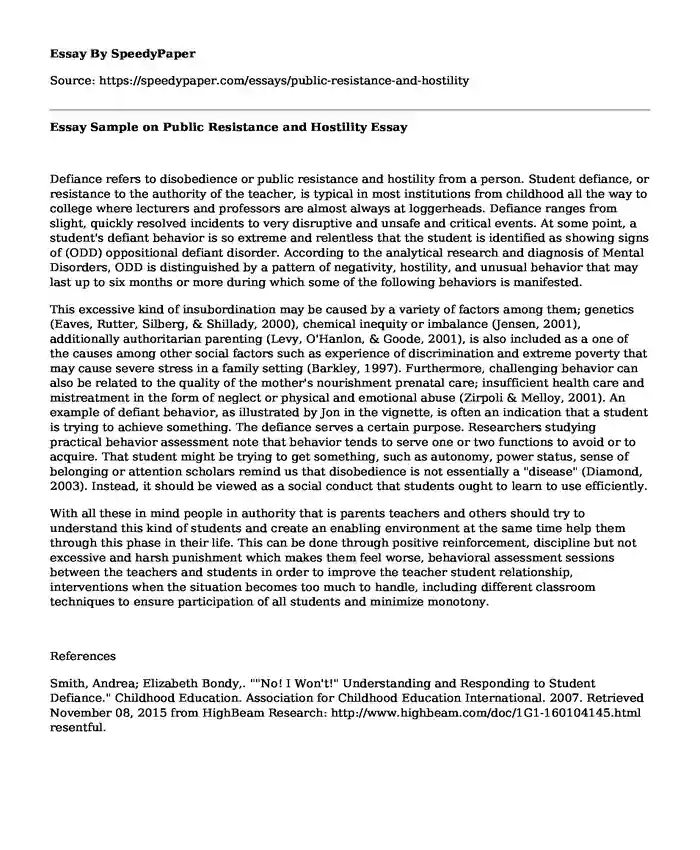
| Type of paper: | Essay |
| Categories: | Education Students Social psychology |
| Pages: | 2 |
| Wordcount: | 450 words |
Defiance refers to disobedience or public resistance and hostility from a person. Student defiance, or resistance to the authority of the teacher, is typical in most institutions from childhood all the way to college where lecturers and professors are almost always at loggerheads. Defiance ranges from slight, quickly resolved incidents to very disruptive and unsafe and critical events. At some point, a student's defiant behavior is so extreme and relentless that the student is identified as showing signs of (ODD) oppositional defiant disorder. According to the analytical research and diagnosis of Mental Disorders, ODD is distinguished by a pattern of negativity, hostility, and unusual behavior that may last up to six months or more during which some of the following behaviors is manifested.
This excessive kind of insubordination may be caused by a variety of factors among them; genetics (Eaves, Rutter, Silberg, & Shillady, 2000), chemical inequity or imbalance (Jensen, 2001), additionally authoritarian parenting (Levy, O'Hanlon, & Goode, 2001), is also included as a one of the causes among other social factors such as experience of discrimination and extreme poverty that may cause severe stress in a family setting (Barkley, 1997). Furthermore, challenging behavior can also be related to the quality of the mother's nourishment prenatal care; insufficient health care and mistreatment in the form of neglect or physical and emotional abuse (Zirpoli & Melloy, 2001). An example of defiant behavior, as illustrated by Jon in the vignette, is often an indication that a student is trying to achieve something. The defiance serves a certain purpose. Researchers studying practical behavior assessment note that behavior tends to serve one or two functions to avoid or to acquire. That student might be trying to get something, such as autonomy, power status, sense of belonging or attention scholars remind us that disobedience is not essentially a "disease" (Diamond, 2003). Instead, it should be viewed as a social conduct that students ought to learn to use efficiently.
With all these in mind people in authority that is parents teachers and others should try to understand this kind of students and create an enabling environment at the same time help them through this phase in their life. This can be done through positive reinforcement, discipline but not excessive and harsh punishment which makes them feel worse, behavioral assessment sessions between the teachers and students in order to improve the teacher student relationship, interventions when the situation becomes too much to handle, including different classroom techniques to ensure participation of all students and minimize monotony.
References
Smith, Andrea; Elizabeth Bondy,. ""No! I Won't!" Understanding and Responding to Student Defiance." Childhood Education. Association for Childhood Education International. 2007. Retrieved November 08, 2015 from HighBeam Research: http://www.highbeam.com/doc/1G1-160104145.html resentful.
Cite this page
Essay Sample on Public Resistance and Hostility. (2019, Jun 13). Retrieved from https://speedypaper.net/essays/public-resistance-and-hostility
Request Removal
If you are the original author of this essay and no longer wish to have it published on the SpeedyPaper website, please click below to request its removal:
- Free Essay on Problem-Solving Techniques
- Whole Foods Mini Base Case, Management Essay Sample
- Extraneous Variables in Nursing Research, Free Essay for Everyone
- Free Essay: Chid Abuse in Child Welfare Services - A Human or a System Error?
- Essay Example: Interest Rates and Inflation in the United States
- Paper Example on Pseudomonas Alkanolytica Using in Treatment
- Essay Sample on FIFO (First-In, First-Out) and LIFO (Last-In, First-Out)
Popular categories




